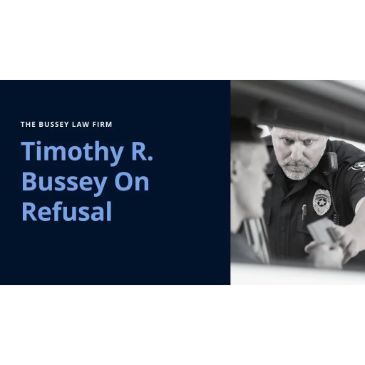 Do I have the right to refuse a DUI test? Is a refusal the same as my “right to remain silent” or “plead the Fifth Amendment?” Will a refusal affect the penalties I will face, or the length of my license suspension? What options do I have when asked to take a blood alcohol test? These are questions DUI defense attorneys often hear. This is what Tim Bussey, a Colorado defense attorney with the ACS Forensic Lawyer-Scientist Designation, has to say.
Do I have the right to refuse a DUI test? Is a refusal the same as my “right to remain silent” or “plead the Fifth Amendment?” Will a refusal affect the penalties I will face, or the length of my license suspension? What options do I have when asked to take a blood alcohol test? These are questions DUI defense attorneys often hear. This is what Tim Bussey, a Colorado defense attorney with the ACS Forensic Lawyer-Scientist Designation, has to say.
VIDEO TRANSCRIPT:
In Colorado, if you are charged with a DUI and it’s a refusal, a lot of folks come to me and say, “I didn’t want to do any tests,” or, “I was told by someone to never do a test, so that’s why I didn’t do the test.” And I want to talk today about refusals and the impact that it will have on a person that is charged with a DUI.
First, remember that there are two different arenas. There is the DMV side of this and the criminal side to this. A refusal can carry with it a longer revocation period. When we are talking about the DMV side of this, what we are looking at is if the officer had a basis to contact the driver, that they established probable cause to believe whether the person was impaired or intoxicated, and if they gave what is called a proper express consent advisement. An express consent advisement is the proper recitation of Colorado’s law concerning whether a driver is required to submit to a chemical test. If the person refuses the test what the Department of Motor Vehicles is looking for is to determine whether or not there were objective manifestations of a refusal.
So for example, if we have a driver that doesn’t give any response to the officer, and the officer says, “This is Colorado express consent. I want you to do a blood or a breath test,” and the person just sits there and says, “I’m not going to do anything,” that can be taken as an objective manifestation of a refusal. There is case law to support that. With that it is important to hire an attorney the determine whether or not there is a basis to be contacted by law enforcement, probable cause established, and proper express consent advisement before a person refused.
On the criminal side, a lot of folks believe that, “hey, I have an absolute right to remain silent, and if I didn’t choose to take a test it can’t be used against me.” Unfortunately in Colorado, a refusal can be used against you on the criminal side at the trial. Here is the way that it works.
What happens is, typically if there was a blood test or a breath test a prosecutor will use that to show if a person was impaired or intoxicated. They will also use the refusal against you. The way they do that is that they are allowed to argue that a person refused a chemical test because they knew they were drunk. They knew they were impaired or intoxicated, and the argument you typically see is, “Ladies and gentlemen of the jury, who here would not take a test that they knew they where going to pass.”
There can be a variety of reasons why a person would refuse a chemical test. They may have a problem with needles, they may not trust law enforcement, there may be a complete breakdown in communication between the driver and the officer. But it is important to have proper legal representation to see if there was any factual issues concerning the case and any legal issues concerning the refusal. It’s important to understand that they will try and use that refusal against you in the court room.
There are many reasons why someone would refuse to take a blood or breath test after being pulled over for a DUI. To learn more about your legal options, call The Bussey Law Firm, P.C., at (719) 475-2555.
